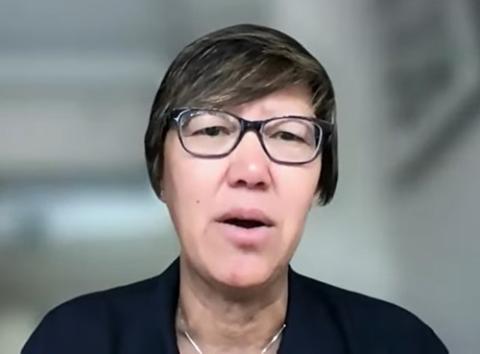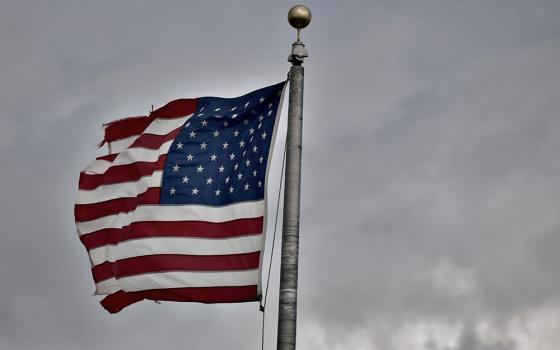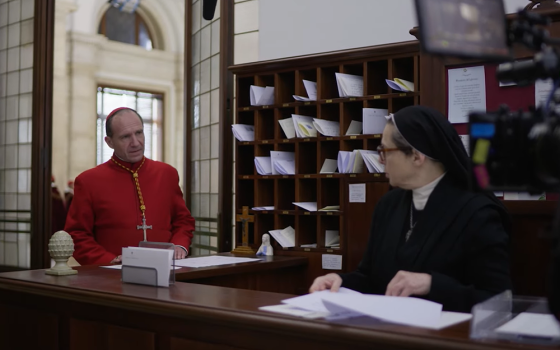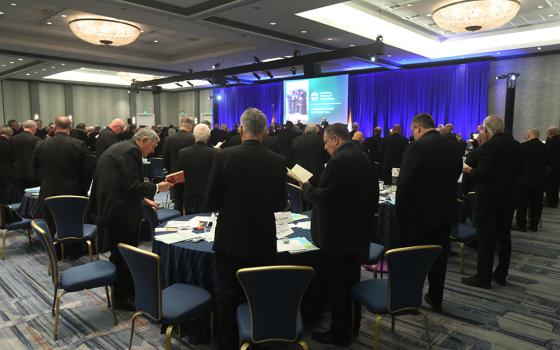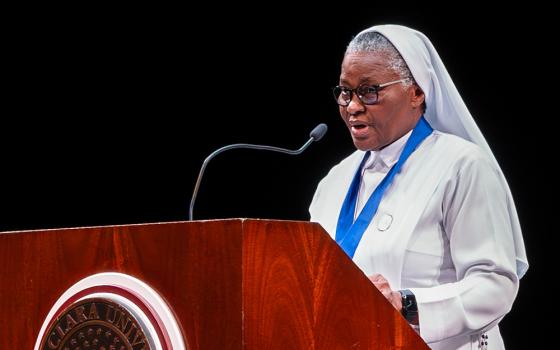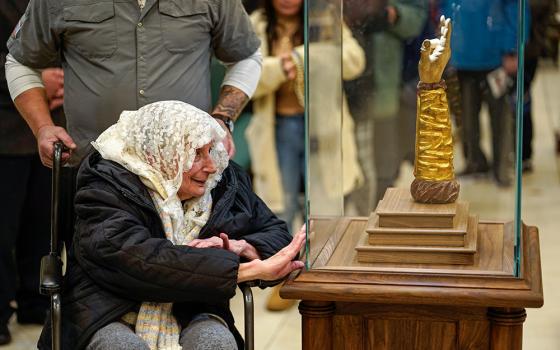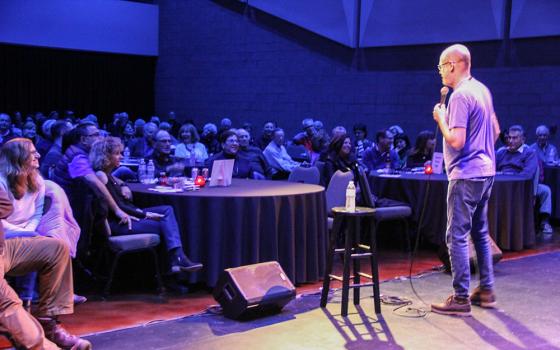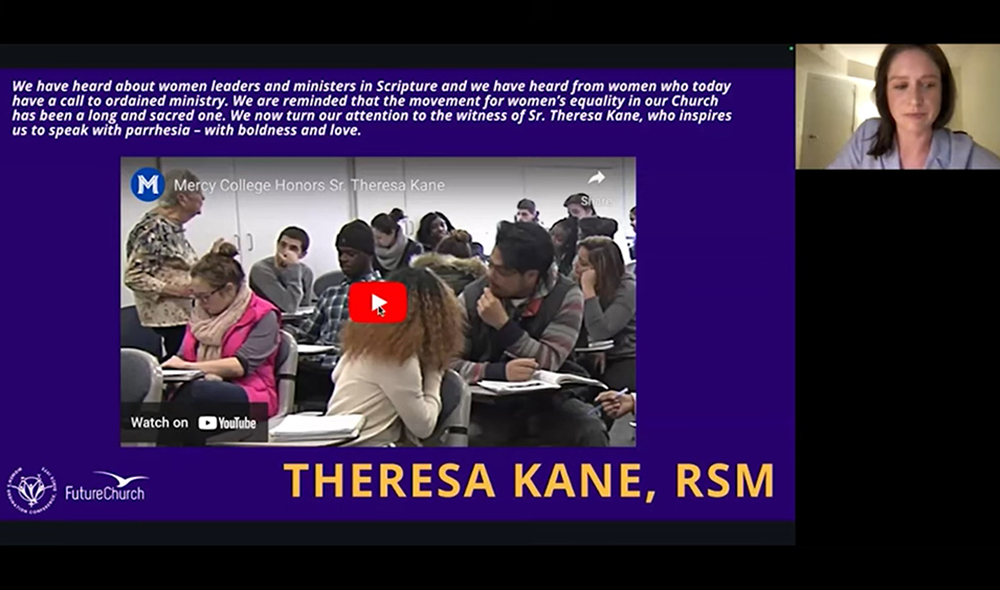
Kate McElwee, executive director of Women's Ordination Conference, leads a June 3 online prayer service hosted by FutureChurch and the Women's Ordination Conference. (NCR screenshot/YouTube)
Alyssa Pedicino wrote her first letter to Pope Francis when she was 9. By that age, she had been an altar server for two years and already felt called to be a deacon, just like her dad.
In her letter, Pedicino congratulated the pope on his new position and shared her frustration that she would be unable to fulfill her calling, given current church rules against women deacons.
"I felt like there was promise," she recalled. "He seemed like someone who'd be willing to listen."
Indeed, over the years, Francis has been open to women's leadership in the church, and established two commissions to examine the ordination of women to the diaconate. The issue also has been discussed as part of the ongoing synod on synodality.
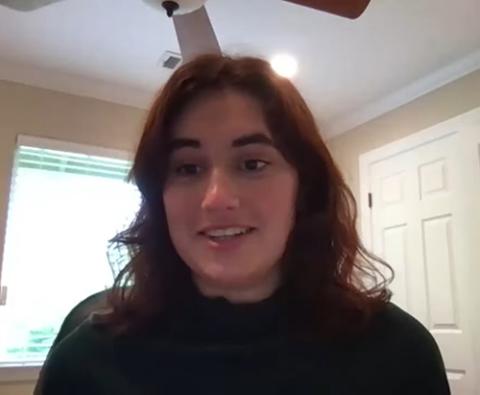
Alyssa Pedicino speaks to participants of the June 3 online prayer service hosted by FutureChurch and the Women's Ordination Conference. (NCR screenshot/YouTube)
So when Pedicino, who is currently a senior at Pomona College in California, heard about Francis' hard "no" to the possibility of women deacons, in response to a question posed during a "60 Minutes" interview, she was disappointed.
It was "like he had failed us," she said during a reflection at a June 3 online prayer service of "lament, hope and witness for inclusive Holy Orders," hosted by FutureChurch and the Women's Ordination Conference.
Yet Pedicino remains hopeful, inspired by communities of Catholics working for change and supporting one another, such as the more than 200 people gathered for the online service, "Diakonia and Determination."
Earlier that evening, the group Discerning Deacons held its monthly St. Phoebe prayer service for a synodal church, led by Australian Catholics Exploring the Diaconate. Some attended both events.
Discerning Deacons co-director Ellie Hidalgo said the organizers referred to the pope's remarks during the service and acknowledged both lament as well as "the impressible power of the Holy Spirit to inspire and disrupt."
Advertisement
In addition, the Association of U.S. Catholic Priests has issued a statement, asking the pope to clarify his comment on women deacons and raising three questions:
- Does this statement supersede the synodal process?
- Will women as deacons still be on the October agenda?
- What are the pastoral and theological reasons for the “No?”
"Of course, a TV interview does not carry the authority of a formal papal declaration," the priests' statement said. "Restoring women to the diaconate is a question of ecclesiology, not doctrine. There is still no doctrinal statement against women as ordained deacons."
During the "Diakonia and Determination," attendees asked for intercession from "our foremothers in faith." The service also featured a reading from Romans 16:1-16, which mentions "our sister Phoebe, a deacon," as well as other female disciples.
Women's Ordination Conference executive director Kate McElwee acknowledged that attendees may feel disappointed, angry, even numb. "There is a space for you in this time of prayer," she said.
"This gathering tonight is far more than a response," McElwee said. "It's a profound witness to the splendid truth that people of all genders are called to ordained ministry by God."
In between reflections from three women, FutureChurch executive director Russ Petrus sang the chorus from "The Servant Song": "Will you let me be your servant? Let me be as Christ to you? Pray that I may have the grace to let you be my servant too."
Rose Lue shared how completing the lay formation program in the Santa Fe, New Mexico, diocese but then not being recognized through ordination made her feel invisible. "It not only hurts me but does a disservice to the church," she said.
Lue said she has "begun to claim my ministerial priesthood," adding, "In my heart, I'm a deacon for the church."
Carmen Ramos of Los Angeles grew up in a Mexican immigrant culture with gender disparities that also discouraged questioning. But it was her faith that taught her that God loved all of her, including her womanhood. She now works in spiritual direction and diaconate formation.
While she does not feel called to ordained ministry, she knows many women who do. "It pains me so much to know women who are suffering this way," she said. "Every ordination I witness, I wonder when as a church will we see women having hands laid over them."
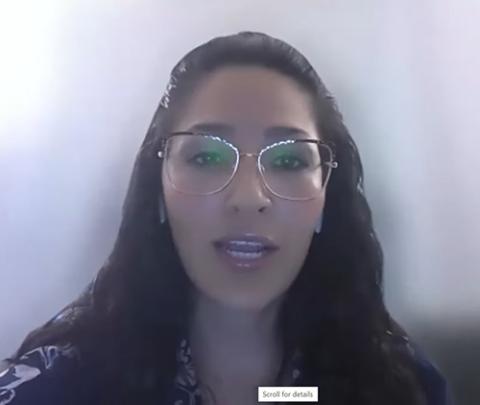
Carmen Ramos speaks to participants of the June 3 online prayer service hosted by FutureChurch and the Women's Ordination Conference. (NCR screenshot/YouTube)
She was excited about the synod, but hearing Francis' rejection of women deacons hurt. She added that, like the Canaanite woman who didn't take no from Jesus, she does not accept the pope's words on this.
"No more will I accept from my church that I'm being told what I should be or not, that the church would discern for me, instead of with me," she said. "No more will I accept that the Christ within me is not recognized."
Yet she, too, remains hopeful. "Pope Francis set in motion something greater than himself, something greater than he can imagine, when he launched the synod on synodality," she said.
In the last 10 years, Pedicino, the Pomona student, has written a total of six letters to Francis, updating him on her life and reiterating her calling. "I just want to share my gifts with the church," she said.
Pedicino has never received a reply.
She encouraged other Catholics to share their feelings of frustration but also of hope. "We don't have to be silenced anymore," she said. "We have a voice, even though it sometimes feels that our church doesn't listen."

